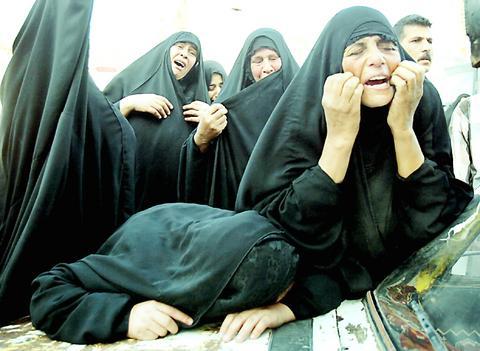Two US soldiers and more than a dozen Iraqi militiamen were killed in skirmishes overnight around the Shiite holy city of Najaf, the fourth day of clashes since militia leader Moqtada al-Sadr offered a truce.
Iraqi leaders sharply criticized US officials for blocking their choice of a president to succeed former president Saddam Hussein when the US occupation authority is wound up in a month's time.
The gulf between US and Iraqi preferences was so wide that US officials asked to postpone talks by a day until today.

PHOTO: REUTERS
With the top post of prime minister filled by Iyad Allawi on Friday and key ministerial jobs also broadly agreed on, deadlock set in when the US-appointed Governing Council rallied behind Ghazi Yawar for the largely ceremonial post of president against Adnan Pachachi, who is favored by Washington and the UN
Both are Sunni Muslim Council members. Yawar is a tribal chief and civil engineer from northern Iraq and enjoys support from Kurds and majority Shiites. Pachachi is an 81-year-old former foreign minister from a Baghdad political dynasty.
"There's quite a lot of interference. They should let the Iraqis decide for themselves. This is an Iraqi affair," said Mahmoud Othman, a Kurd on the 22-member Council.
Many Iraqis question whether the Council truly represents public opinion. Washington asked UN envoy Lakhdar Brahimi to consult broadly among Iraqis and nominate an interim government to oversee elections in the new year.
But the Governing Council caught Brahimi off-guard on Friday by announcing the choice of Allawi, a secular Shiite who worked with the CIA from exile to overthrow Saddam. It appears set on having its way again. US and UN officials were not available for comment and their objections to Yawar were not clear.
The current head of the council, he left Iraq in 1990 and ran a telecoms company in Saudi Arabia. He has criticized the US-drafted UN resolution that sets out the handover plan, complaining it gives Iraqis too little control of the 150,000 mainly American foreign soldiers remaining in the country.
The US military said two soldiers were killed by Shiite militia at Kufa, just outside Najaf, late on Sunday and that US troops killed close to 20 guerrillas in response.
A car blew up on a busy Baghdad street yesterday, killing two Iraqis and wounding 13. The cause of the blast was unclear.
A bomb blew up in a van as a Dutch patrol approached it in Samawa but there were no casualties, Dutch troops at the scene said. Japanese forces are also in the area.

The US government has signed defense cooperation agreements with Japan and the Philippines to boost the deterrence capabilities of countries in the first island chain, a report by the National Security Bureau (NSB) showed. The main countries on the first island chain include the two nations and Taiwan. The bureau is to present the report at a meeting of the legislature’s Foreign Affairs and National Defense Committee tomorrow. The US military has deployed Typhon missile systems to Japan’s Yamaguchi Prefecture and Zambales province in the Philippines during their joint military exercises. It has also installed NMESIS anti-ship systems in Japan’s Okinawa

‘WIN-WIN’: The Philippines, and central and eastern European countries are important potential drone cooperation partners, Minister of Foreign Affairs Lin Chia-lung said Minister of Foreign Affairs Lin Chia-lung (林佳龍) in an interview published yesterday confirmed that there are joint ventures between Taiwan and Poland in the drone industry. Lin made the remark in an exclusive interview with the Chinese-language Liberty Times (the Taipei Times’ sister paper). The government-backed Taiwan Excellence Drone International Business Opportunities Alliance and the Polish Chamber of Unmanned Systems on Wednesday last week signed a memorandum of understanding in Poland to develop a “non-China” supply chain for drones and work together on key technologies. Asked if Taiwan prioritized Poland among central and eastern European countries in drone collaboration, Lin

Renewed border fighting between Thailand and Cambodia showed no signs of abating yesterday, leaving hundreds of thousands of displaced people in both countries living in strained conditions as more flooded into temporary shelters. Reporters on the Thai side of the border heard sounds of outgoing, indirect fire yesterday. About 400,000 people have been evacuated from affected areas in Thailand and about 700 schools closed while fighting was ongoing in four border provinces, said Thai Rear Admiral Surasant Kongsiri, a spokesman for the military. Cambodia evacuated more than 127,000 villagers and closed hundreds of schools, the Thai Ministry of Defense said. Thailand’s military announced that

CABINET APPROVAL: People seeking assisted reproduction must be assessed to determine whether they would be adequate parents, the planned changes say Proposed amendments to the Assisted Reproduction Act (人工生殖法) advanced yesterday by the Executive Yuan would grant married lesbian couples and single women access to legal assisted reproductive services. The proposed revisions are “based on the fundamental principle of respecting women’s reproductive autonomy,” Cabinet spokesperson Michelle Lee (李慧芝) quoted Vice Premier Cheng Li-chiun (鄭麗君), who presided over a Cabinet meeting earlier yesterday, as saying at the briefing. The draft amendment would be submitted to the legislature for review. The Ministry of Health and Welfare, which proposed the amendments, said that experts on children’s rights, gender equality, law and medicine attended cross-disciplinary meetings, adding that